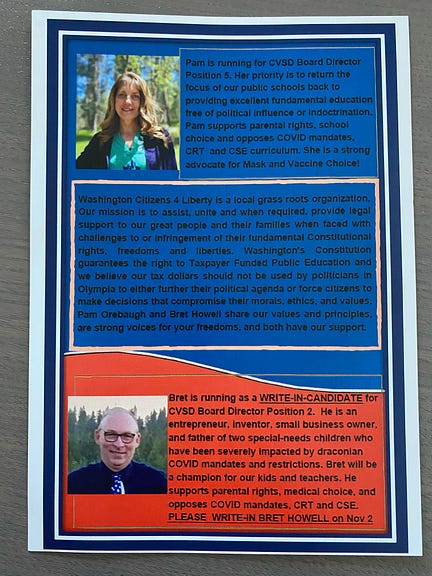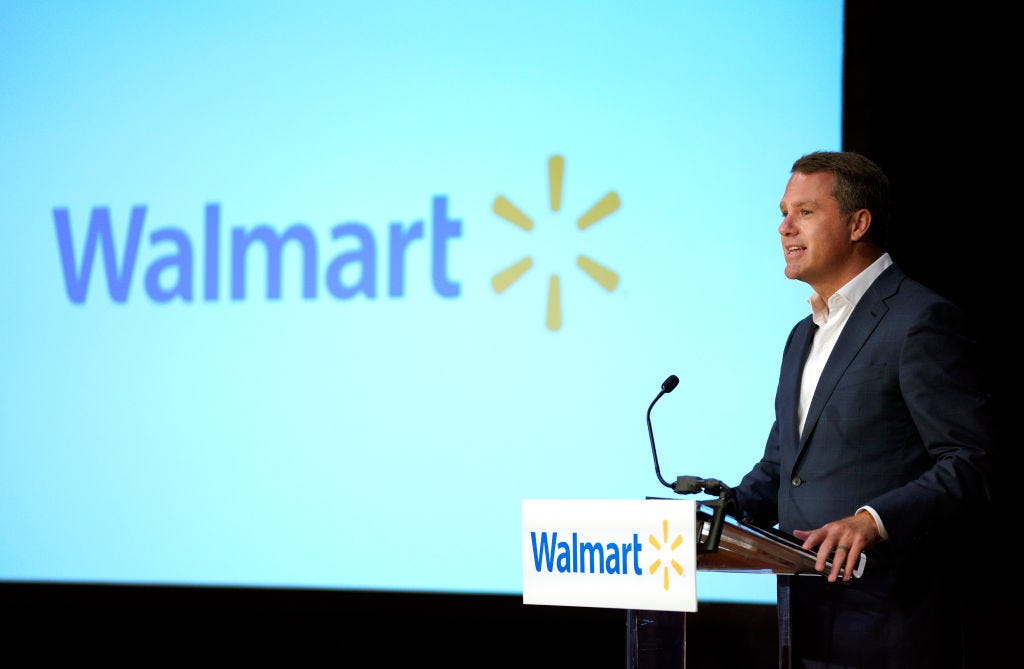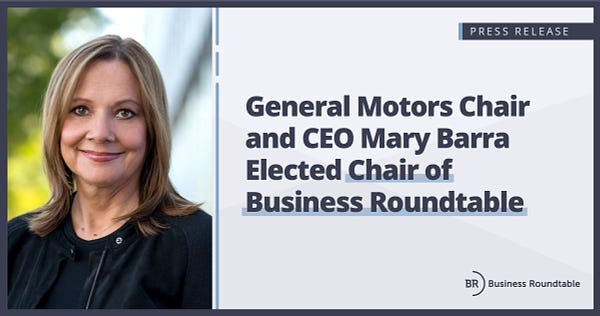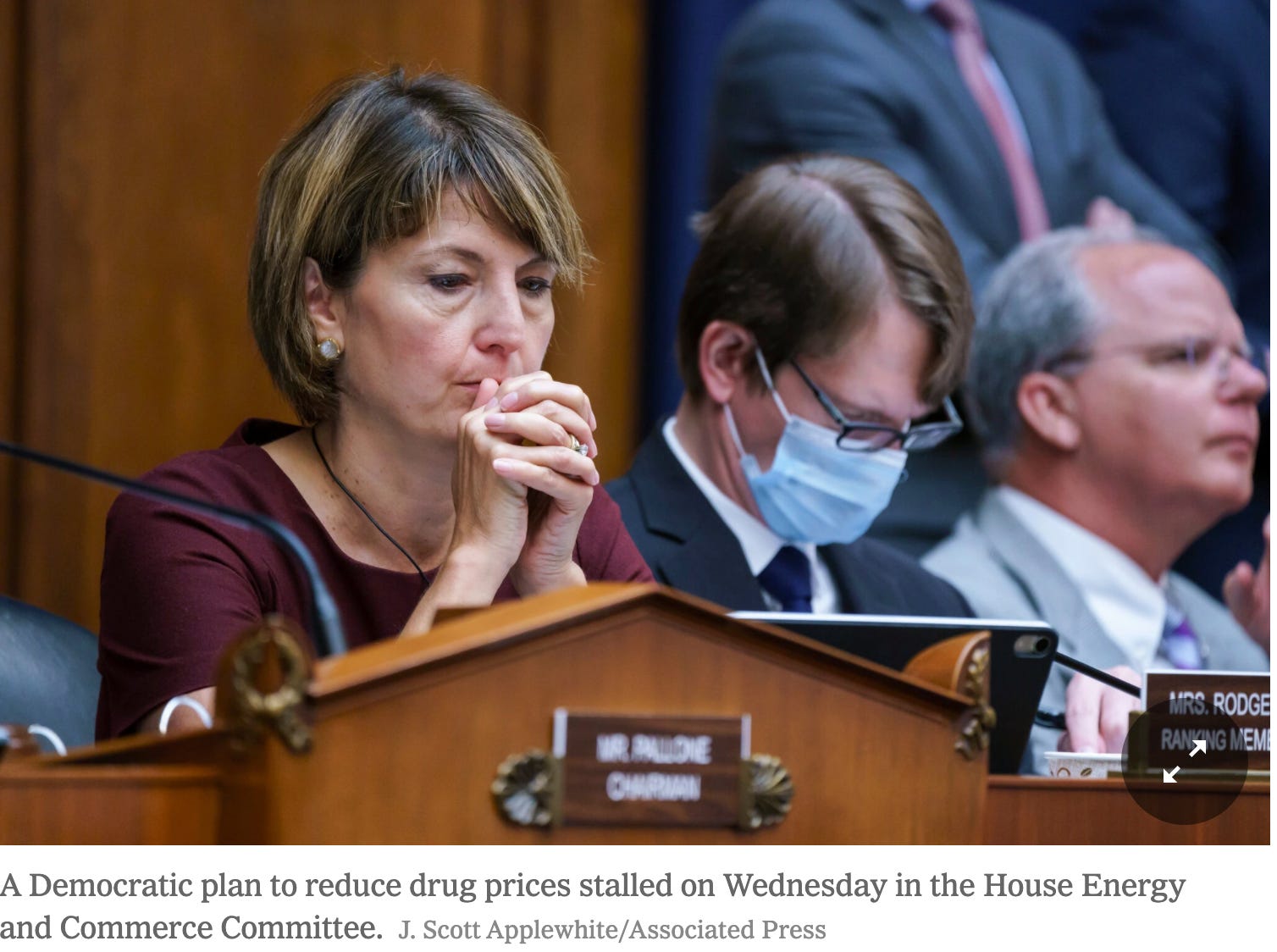All of Us Need to Pay Attention


Pam Orebaugh and Rob Linebarger in Spokane valley are fomenting a hostile takeover of the entire five person School Board of Central Valley School District (CVSD). Their campaign is based on religio-political, anti-science rhetoric against mask mandates, masks, and vaccinations. Pam and Rob appear as supposed opponents for Position 5 on the CVSD Board on the November 2 general election ballot—but they are allies, partners in their attempt to replace the entire Board. In a sleepy August Primary in which only a quarter of the registered voters bothered to turn in a ballot, Pam garnered 5951, Rob 4962 and their opponent 4674 votes out of the 15761 votes cast. These are not large numbers, but Pam and Rob apparently see them as a mandate.
Rob and Pam’s fanaticism came on public display in the unofficial meeting they held on school property after they and their followers engineered a boisterous shutdown of the August CVSD Board meeting on August 23 by refusing to comply with the state mask mandate then in place. These are the same tactics and ideology that fired up the attack on members of the Coeur d’Alene School District Board I detailed on Monday. I urge you to watch and listen to Mr. Linebarger in this video:
https://www.facebook.com/ChalichForChildren/videos/1004052080442312/
Mr. Linebarger’s conspiracy-laden oration speaks for itself. This is not a man interested in the intricacies of school budgets and discussion under Roberts Rules of Order. This is a man who sounds primed for revolution, armed, if necessary. Rob’s partner in this plan, Pam Orebaugh, takes a quieter role at the unofficial gathering. She is seen intermittently sitting to the far right in the screen view and referred to by Rob as an ally. At 01:54 she walks across the room behind Mr. Linebarger.
This video should, and did, set off alarm bells. Stan Chalich, a retired Central Valley coach and civics teacher, stepped up as a popular write-in candidate for Position 5. Winning a write-in campaign is an up hill battle, but if you watch the video you will likely agree that the stakes are high.
Bret Howell (seen in the flier above), encouraged by Rob and Pam, is running as a write-in candidate for Position 2, the only other CVSD board seat on the ballot in November. The only candidate already on the ballot for that Position 2 seat, Teresa Landa, Pam and Rob apparently think of as insufficiently right wing.
There’s more. On August 24th Rob and Pam, with Rob in the lead, filed an application with the IRS for 501(c)(3) [tax exempt non-profit] status for their “Washington Citizens for Liberty.” As “citizens4liberty.org” they began soliciting tax-deductible donations to pay for legal council immediately, counting on the IRS to validate and backdate the tax-deductible status for which they had applied. Visit “citizens4liberty.org” and see for yourself the far right news rathole on which these people rely as well as the wacko anti-vaccine rhetoric they espouse. Money gathered by the citizens4liberty “non-profit” is to be used to pay legal costs incurred to threaten the other three sitting CVSD school board directors with a recall election. Those directors, Debra Long, Cindy McMullen, and Keith Clark, in addition to their other volunteer board duties, now will need to defend themselves in court against a recall.
Contemplate for a moment the reaction you might have if you had been serving your community as an unpaid member of the school board with all the attendant meetings and homework—and then you were faced with hiring a lawyer and defending against a legal threat as the price you must pay for continuing to donate your time and good will.
The September 28 Spokesman article written by Jim Allen announcing Rob and Pam’s recall petition filings against all three of the remaining CVSD Board directors left me puzzled (as newspaper articles often do) about the steps involved in an attempted recall. Recalls of “elective officers” in the State of Washington are addressed in Article I, Sections 33 and 34 of the Washington State Constitution. The details of the process are filled in by state law in the Revised Code of Washington (RCW) 29A.56.110 thru RCW29A.56.270. It is a complex process with many steps and deadlines, a process which, in the case of Linebarger’s three recall petitions, will hardly have started by the time the November 3 General Election voting is complete one month from now.
The substance of these recall petitions is very thin. It consists of allegations that Debra Long, Cindy McMullen, and Keith Clark each
committed acts of misfeasance, specifically misuse of power and wrongful use of lawful authority in the exercise of her office where she and her fellow Board Members, as a matter of policy, have mandated the use and placement of a medical device, specifically a mask, and now require District staff to have the first publicly available mRNA vaccination as a condition of employment
Essentially, Pam, Rob, and company allege that the CVSD’s Board directors are committing “malfeasance” by carrying out state level executive orders—a preposterous claim that will likely be thrown out, just like a similar recall against Governor Jay Inslee was thrown out when a judge ruled the alleged charges were “legally and factually insufficient last June.”¹
In summary, we have two candidates for the same Position 5 spot on the CVSD School Board, Pam Orebaugh and Rob Linebarger working together not only to get Pam elected to the board, but soliciting tax deductible unreported donations to their nonprofit, Citizens4Liberty, to 1) Support Pam’s and write-in candidate Howell’s candidacies and 2) Launch and fund dubious recall petitions against the other sitting school board members, petitions that function as a combination of grandstanding and legal harassment.
Whether or not you live in the Central Valley School District, this school board election is a consequential issue. It is one of the most blatant local manifestations of an organized national campaign. (Also in the Washington Post.) Watch the Rob and Pam video referenced above. Understand where Pam and Rob are coming from by visiting the News page at Citizen4Liberty.org . Then visit Stan Chalich’s website, check out the impressive endorsements on his Facebook page. Donate to his campaign. Tell your friends about the Stan Chalich write-in campaign.
Keep to the high ground,
Jerry
P. S. I have obtained pdf copies of the recall petitions Linebarger filed on September 24, but I’ve been unable to attach them to this post. If any of my readers wants to see the pdfs request them of me by hitting “Reply” to this email and I will endeavor to send them to you electronically.
P.P.S. Pam Orebaugh draws points for herself as a faculty nurse educator for obstetric nursing at the Washington State University College of Nursing. However (and for good reason) she notes that she is “not representing WSU or speaking for WSU in my stances.” Her anti-mask, anti-vaccination stances do not represent reasoned medical opinion.1
Debra Long, the board president and one of the three board members defending against recall, is also accused of not meeting residency requirements for her position—while the other two are accused of knowing this and not tattling on her. This accusation is detailed in Jim Allen’s Spokesman article. It seems likely that the Superior Court Judge who, according to the RCW, will need to sign off on the petition for Rob, Pam and company to start gathering signatures will find this accusation “factually insufficient” as well, but who knows?







